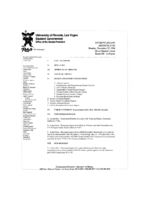Search the Special Collections and Archives Portal
Search Results
Marge Jacques Papers
Identifier
Abstract
The Marge Jacques Papers (1960-1990) comprise the personal papers of Marge Jacques, a prominent member of the Las Vegas, Nevada gay and lesbian community, and owner of the gay bar, Le Cafe. The papers contain correspondence, licensing records, financial statements, and artifacts from clubs that Jacques owned or managed. Also included are photographs, videotapes, audiotapes, newspaper clippings, and Gipsy Nightclub promotional material.
Archival Collection
Joseph "Wingy" Manone Papers
Identifier
Abstract
The Joseph "Wingy" Manone Papers (1934-1996) include a partial draft of his autobiography, newspaper clippings, correspondence, magazine articles, and press releases related to his musical career. Manone also wrote music, some of which is included in the collection.
Archival Collection
Central Credit, Inc. Records
Identifier
Abstract
The Central Credit, Inc. Records (1956-1987) contain meeting minutes, employee records, business ledgers, newspaper clippings, membership applications, photographs, and reports. Also included are incorporation papers, a Code of Ethics, Credit Law, Tod Early's personal calendars/diaries, and audiovisual materials. Central Credit, Inc. had branches in Reno, Las Vegas, and Lake Tahoe, Nevada, and also in London.
Archival Collection
UNLV Libraries Collection of Aztar Corporation Financial Reports and Press Materials
Identifier
Abstract
The UNLV Libraries Collection of Aztar Corporation Financial Reports and Press Materials includes annual reports, financial reports, equity research reports, prospectus, press releases, market analysis, a company plan, and newspaper clippings for Aztar Corporation which was based in Phoenix, Arizona, dating from 1991 to 2006.
Archival Collection
Bob Parker Photograph Collection
Identifier
Abstract
The Bob Parker Photograph Collection consists of twenty-seven black-and-white photographic prints showcasing the construction of the Hoover Dam (Boulder Dam) from approximately 1930 to 1942.
Archival Collection

Transcript of interview with Joe Lappin by Gordon Brusso, March 4, 1976
Date
Archival Collection
Description
On March 4, 1976, Gordon Brusso interviewed former miner, Joe Lappin (born November 14th, 1914 in Santa Paula, California) about his life in Boulder City, Nevada. The two discuss his early occupational history and his work for the Bureau of Mines. He then goes on to explain the different housing systems that developed in Boulder City during World War Two.
Text

Transcript of interview with Eldon Cunningham by Randall L. Williams, March 14, 1981
Date
Description
On March 14, 1981, Randall Williams interviewed Eldon Cunningham (born 1920 in Granby, Missouri) about his life in Las Vegas, Nevada. Cunningham first talks about his family background, his reason for moving to Las Vegas, and his service in the military during World War II. He also mentions the Twin Lakes area of Las Vegas, his hobby of prospecting, and his work with Clark County Electric as an electrician. Cunningham also talks in detail about some of his experiences while working at the Nevada Test Site in electrical work. As the interview concludes, Cunningham talks more about family illnesses, experiments at the Test Site, and his former hunting practices.
Text

Transcript of interview with Mary & Bruce Eaton by Beatrice Scheild, March 8, 1975
Date
Archival Collection
Description
On March 8, 1975, Beatrice Scheid interviewed Mary and Bruce Eaton about their lives in Boulder City, Nevada. Mary first talks about her life in the early days of Boulder City, specifically the influences of the churches and schools. She also talks about housing, transportation, and her career as an educator. Bruce (born 1904 in Toronto, Kansas) also talks about his life in Boulder City and his arrival to Southern Nevada as he sought employment in working on the building of Hoover Dam. Bruce talks about his employment with Six Companies, Inc. and discusses topics such as the employment wages, his and Mary’s experiences in building a house, and their experiences in buying a house built by Six Companies. Bruce also talks about the roles of Sims Ely, the city manager of Boulder City, and Frank Crowe, the construction superintendent of Six Companies. Bruce then discusses the issues of worker’s compensation as it related to work on the dam, and he describes, in detail, the cooling system us
Text

Transcript of interview with Flora Hannig-Kellar by Michael Taylor, March 27, 1981
Date
Archival Collection
Description
On March 27th, 1981, collector Michael D. Taylor interviewed housewife Flora Hannig-Kellar (born January 24th, 1902 in Washington, Utah) in Henderson, Nevada. This interview is Flora Hannig-Kellar’s personal account on growing up in Nevada. She discusses home and family life and local social and recreational activities. During the interview Mrs. Hannig-Kellar also shares some of the poetry she wrote about Nevada and her family, specifically her children and grandchildren.
Text

Meeting minutes for Consolidated Student Senate University of Nevada, Las Vegas, November 25, 1996
Date
Archival Collection
Description
Text
